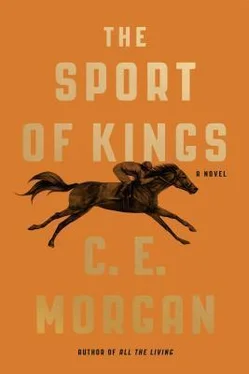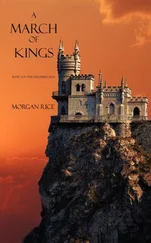“Yes, I want a field of flowers. My grandson will like that.”
Penn smiled, but he was silent as he looked on the pair. There was something he didn’t quite trust about the older man. Not that he was a bad guy necessarily … just not fully formed or something. Did he want to grow a garden, or did he want to be the kind of guy who grew a garden?
Eh, what did it matter? Penn shrugged in his mind. He was watchful and methodical, the guardian of his own opinions, of which he had more than a few, but ultimately he would help out anyone in need. It’s how his dumb ass got sent to war.
“And I’d like to prepare additional space for next year.” Henry stepped down off the porch, so that he stood shoulder to shoulder with Penn. “Put marigolds and petunias in after the freeze.”
The younger man’s head ticked to the left. “Sure,” he said, “but if that’s what you want, you’re gonna need more room. What’s with these bushes?” He gestured to his right.
“That’s a windbreak.”
“Well, it’s in the way. You need it?”
Henry hefted his grandson higher onto his chest and, brow crumpled, watched as the boy busily gummed his own fist. He smelled like sunlight and the warm, particular, inimitable scent, which was his own person. His eyes were bright and impossibly untroubled. “Perhaps not,” Henry said softly.
“But you’ll need a backhoe.”
“I have a backhoe.”
“Well,” said Penn with a smile, shaking his head slightly. “All right. Show me where the backhoe’s at.”
So, they worked together, he and Penn. First Henry laid out a checkered tablecloth upon which Samuel rolled and made his froggish motions in the sun, a shaker clutched in his hands. One eye to Samuel, Henry helmed a rototiller that chewed its lurching way through the tender lawn, as Penn, perched on the sun-busted seat of the backhoe, began to extract the edges of—
— my God, I get so tired sometimes, I can’t tell you how it was. I try to cut to the pith with the blade of my life, but it’s a dull blade from a common kitchen. My people came out of the mountains to Ohio; my grandfather was born in a tent near the oil wells, and my parents were poor. I’m not beautiful or clever; all I can offer is the brief portrait of a spring’s plantation, the smell of the sweat of labor, the color of a child’s eye, and sometimes not even that. What can you do? You can’t pray for yourself. The gods disallow it—
“Hey! Henry!” Penn had ground the backhoe to a halt and was twisted back and around with one hand gripping the bucket seat, the other on the wheel. “What is this? You want it out?”
Henry left his post at the rototiller and picked his way along the fresh soil until he rounded the edge of the remaining windbreak. There the thing jutted out of the earth like an arrow pointing to the sky. For a moment, Henry could not configure the object in his mind, could make no sense of its height, its brown hue, the wood patina like rot. Then, when memory finally slid home and he realized it was the old whipping post, he couldn’t speak, couldn’t blink. Time rolled back his eyelids and pinned them to his skull.
He whispered something barely intelligible.
“What?” said Penn, leaning down. “You want it out…?”
Henry drew in one tremble of breath, made a roundabout gesture with one hand. When Penn just shook his head in confusion, Henry raised his voice. “Leave it there,” he said. “Make a scarecrow of it.”
Penn grinned slowly, then nodded. “For the garden. Right. Yeah. We can dress it up in some of your old clothes or something.” Then righting himself on the seat of the backhoe, he brought the engine back to life and managed to uproot the rest of the tangled thicket without disturbing the post where it remained, leaning like an old ruin, dark and scarred, a remnant of centuries-old hickory and hurt.
But Henry could not continue in his work. He turned his back on the post and walked the freshly fertile ground to Samuel, who was now gnawing fistfuls of fresh grass. As Henry plucked grass from his lips, the child began to whimper and then wail in outrage. Henry lowered himself to his knees, grasping the child’s crabby face in his hands and looking down at him with bright sadness and satisfaction. Again, he reckoned with the full enormity of the change in himself. The change was a disturbance and more: a deeper, astonishing resolution. For a moment, in the golden almost-liquid beauty of the afternoon, he felt that his daughter had finally fallen silent. Her mouth was shut, the ink in her notebooks dry. His grief felt less like the crushing of his chest and more like the memory of the crushing. Was the worst of his pain over? Was that possible?
Henry walked to the kitchen to make a gold rush for two: bourbon with lemon and honey over ice. He passed the site of the original kitchen fifteen yards from the house, a kitchen that was razed when they filled in the old ice well. He had been seven then, just a kit in the yard, his mother a minx. He passed a hand over his eyes, weary and wary of his old mind.
As he arranged two icy tumblers on an old silver tray, a gem Lavinia had bought at auction in Nashville on a horse-buying trip, the landline shrilled. His hand jerked, and a tumbler shattered to shards in the white ceramic basin of the sink.
When he grasped up the receiver, the voice — firmly lodged in the nose and unmistakably northeastern — said: “Mr. Forge? Hello, I’m so glad to have reached you. I’m the assistant to M. J. Deane. I’d like to congratulate you on your amazing horse.”
“Thank you very much.”
“I’m sure you’re getting more interview requests than you can field, but my employer would very much like to interview you for a book on Kentucky history and horse racing. Would you be at all interested in participating?”
Henry was silent for a moment, trawling through the recesses. The name flicked at the edges of familiarity.
Into the silence the woman said, “Deane writes mysteries, but also general nonfiction. Perhaps you have read some of the books, or at least seen them around. Or articles in The New Yorker. On cuisine, mostly.”
The food articles — yes, that rang a bell. And, of course, he realized now, he’d seen the books in airports. With one careful hand, he reached down to arrange the glass shards, which littered the sink. “Yes,” he said. “Yes, I believe we can work something out.”
The assistant said, “Wonderful. Well, an interview on the morning of the Derby would be perfect, if that’s not too much to ask. I’m sure that will be a crazy day for you, but we figured there’s no harm in asking.”
“The morning of the Derby?” It was an odd, even improbable request. He hesitated. But this wasn’t a journalist from a local paper or even the Times ; this was something more intriguing, potentially more durable. A book featuring the Forge name. It stirred him. “Yes,” he said slowly, “that might be possible.”
“Will you be in Louisville or in Paris that morning, sir?”
He was startled to discover that he had no ready answer. Of course, he should be in Louisville — for the parties, the glad-handing, the carousing that would precede the running of the race. And yet … he gazed out the window, his heart a tuning fork tuned to Samuel. He watched his tiny grandchild on his fat belly, grasping again at bunches of grass; he was like a foundling who had arrived with a message for change from the deep underworld, a note passed to him from his daughter. So she was not silent after all. A knowing pressed up into the space where his heart had been knocking about uselessly for so long. It was both a blessing and an affliction. Relaxation flooded his body as if his old, worn organs were being replaced with an emptiness that was not terrifying but delicious. Into the emptiness wended a pride — yes, he was proud of everything he had accomplished, his farm and his horse, his new feelings for his grandchild, how he was transforming the family name. His smile was broad when he said, “Yes, I will be right here at Forge Run Farm on the morning of the Derby.”
Читать дальше
Конец ознакомительного отрывка
Купить книгу












